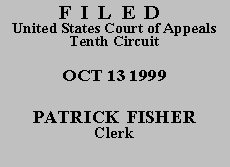

| JAMES R. HOWELL,
Plaintiff-Appellant, v. KENNETH S. APFEL, Commissioner, Social Security Administration, Defendant-Appellee. |
|
Plaintiff James R. Howell appeals the district court's affirmance of the final decision by the Commissioner of Social Security denying his application for supplemental security income (SSI). Because the administrative law judge (ALJ) committed legal error in evaluating plaintiff's subjective complaints, we reverse and remand for further proceedings.
In December 1993, plaintiff filed this second application for SSI benefits, alleging an inability to work due to ankylosing spondylitis, heart disease, keratoconus (degenerative blindness), chest pain, back pain, extremity pain, depression and exhaustion. After a hearing, an ALJ determined that although plaintiff could not perform his past work, he retained the ability to perform a significant number of jobs in the national economy and therefore was not disabled. The Appeals Council denied review, making the ALJ's decision the final decision of the Commissioner. The district court affirmed, and this appeal follows.
We review the agency's decision to determine whether the factual findings are supported by substantial evidence and whether correct legal standards were applied. See Hawkins v. Chater, 113 F.3d 1162, 1164 (10th Cir. 1997). Substantial evidence is "such relevant evidence as a reasonable mind might accept as adequate to support a conclusion." Richardson v. Perales, 402 U.S. 389, 401 (1971) (quotation omitted). We may "neither reweigh the evidence nor substitute our judgment for that of the agency." Casias v. Secretary of Health & Human Servs., 933 F.2d 799, 800 (10th Cir. 1991).
Plaintiff argues that the agency's decision is not supported by substantial evidence because the ALJ selectively ignored medical evidence which supported plaintiff's testimony about his limitations. He argues also that the ALJ committed legal error by failing to engage in the specific analysis required by Luna v. Bowen, 834 F.2d 161, 163-66 (10th Cir. 1987), and by failing to give plaintiff's treating physicians' opinions the required deference. Because this last issue was not raised to the district court, we will not consider it on appeal. See Crow v. Shalala, 40 F.3d 323, 324 (10th Cir. 1994).
The evidence shows plaintiff suffers from several impairments: (1) a back injury which may or may not be full spine ankylosing spondylitis, but which, at a minimum, has been described as severe degenerative joint disease; (2) status post-myocardial infarction with three vessel coronary disease and mild left ventricular dysfunction; and (3) keratoconus, resulting in no visual acuity in the right eye and slightly impaired vision in the left eye. At the hearing, plaintiff testified to severe limitations imposed by his back and heart conditions, stating he could only stand for thirty minutes, sit for thirty minutes, or walk for thirty minutes at a time. He also testified to severe fatigue from his heart condition. The ALJ rejected these complaints, finding plaintiff's testimony credible only to the extent it was consistent with a residual functional capacity for medium work with certain limitations. The ALJ did not identify the evidence upon which he relied to reject plaintiff's testimony, however, simply setting out the following laundry list of factors allegedly considered:
After careful evaluation of the claimant's signs and symptoms; the nature, duration, frequency, and intensity of the pain; the factors precipitating and aggravating the pain; the dosage, effectiveness, and side effects of the medication taken for relief of pain; the claimant's functional restrictions and the combined impact on the claimant's daily activities, the Administrative Law Judge finds that the claimant is not suffering from a totally disabling pain syndrome according to the criteria established in 20 C.F.R. § and (sic) 416.929, see also Social Security Ruling 88-13.
Appellant's App. at 22-23. In Kepler v. Chater, 68 F.3d 387, 390-91 (10th Cir. 1995), we reversed a decision in which an ALJ used almost exactly the same language to reject a claimant's complaints of disabling pain. We held there that the ALJ could not simply conclude that the plaintiff's subjective complaints were incredible, but instead must make express findings linking his credibility determination to relevant evidence in the record. See id. at 391.
Here, plaintiff's medical records document that he suffers from a severe back condition. From 1989 forward his records show fairly consistent complaints about back pain and stiffness. The records also show that despite plaintiff's recovery from his myocardial infarction, he still has a number of partially or completely occluded arteries which are capable of producing angina, see Appellant's App. at 175-76, and at least one physician has accepted plaintiff's description of his anginal pain as "reliable," id. at 221. His treating physician opined that plaintiff's fatigue and shortness of breath are related to his heart condition. See id. at 209. Without any explanation to support the rejection of plaintiff's subjective complaints, we are left to speculate what specific evidence led the ALJ to conclude plaintiff's pain and fatigue are not disabling. See Kepler, 68 F.3d at 391. Therefore, the case must be remanded for further proceedings.
The judgment of the United States District Court for the Northern District of Oklahoma is REVERSED, and the case is REMANDED for further proceedings.
Entered for the Court
Circuit Judge
*. This order and judgment is not binding precedent, except under the doctrines of law of the case, res judicata, and collateral estoppel. The court generally disfavors the citation of orders and judgments; nevertheless, an order and judgment may be cited under the terms and conditions of 10th Cir. R. 36.3.